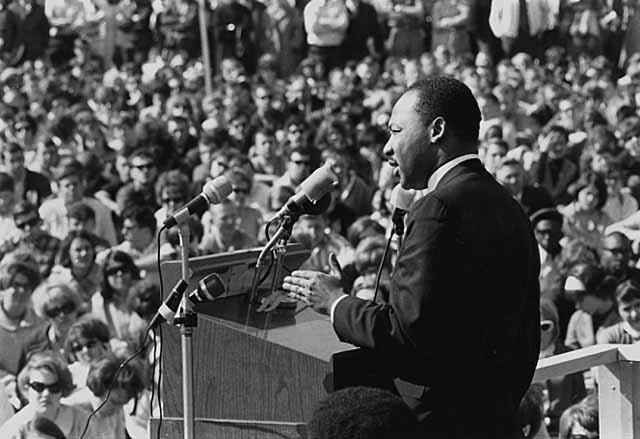From the March-April 2022 issue of News & Letters
by Faruq
Martin Luther King, Jr., said in his sermon of April 3, 1968, on the eve of his assassination: “I’ve seen the Promised Land. I may not get there with you. But I want you to know tonight, that we, as a people, will get to the Promised Land.”
FREEDOM, THE IRREPRESSIBLE IDEA

Rev. Martin Luther King Jr. speaks against the Vietnam War at University of Minnesota in St. Paul, April 27, 1967. Photo: en.wikipedia.org/
King’s reference to the Promised Land was his way of talking about the irrepressible idea of freedom. That idea reaches beyond any one individual’s life, and also beyond any of its particular manifestations, such as the Civil Rights Movement. He was going beyond the scope of the movement to confront the inhumanity of the economy as sanitation workers in Memphis were demanding human dignity: a living wage and better working conditions.
Black history and the idea of freedom are inseparable. We have to teach that Black history is the history of humanity becoming free.
King was reaching for the world to recognize everyone’s humanity. His assassination highlighted the prophetic nature of that last speech. Assassinations are the pattern for Black men who speak out for humanity in such a total manner. King had to know that taking a position against the Vietnam war and challenging the concentration of wealth, put his life in even more danger.
He declared that the U.S. is the foremost purveyor of violence in the world. The elephant in the room is the accumulation of wealth and power at the cost of others’ lives.
When the idea of freedom is not articulated for itself, it can turn into its opposite. The celebration of Black history began by Black people expressing their desire to know their true identity and take pride in their striving to be free. But it lost its way. Richard Nixon was clever to turn Black Power into Black enterprise zones. It enabled a few Black people to get rich but lost sight of the idea of freedom.
George Jackson said when poverty comes in the front door, love leaves through the back door. Property engenders selfishness, you fear losing it. It changes your relations to others. When I was growing up, the Black neighborhoods did not have much property. Yet I didn’t think we were poor, needing things. I never had to have a key to get into anyone’s house, no doors were locked.
U.S. HISTORY IS BLACK HISTORY
Property seems to be the basis for U.S. power in the world. But the creation of that property was a result of the work of mostly slaves and immigrants.
Since it was slavery that drove the development of the U.S. from its start, how can one separate U.S. history from Black history? What Marx called capitalism’s absolute general law is the ever-growing discarding and dislocation of humanity as redundant. We are all bound to this system that holds back humanity’s self-development and self-expression. Blacks experienced that totally under slavery and today it is also people’s everyday lives as a result of this absolute general law.
Every day I see people suffering from various mental health issues. I see tents, human waste all over, people sitting on cardboard. People looking for food in the dumpsters is no longer a Third World phenomenon. All that to convince you how important it is to get a job. The rich are getting richer, while poverty is deepening.
Work has to be redefined. It is associated with slavery. But it needs to be recreated as time to develop myself, to express my humanity. If you don’t understand the absolute general law of capitalist development, you don’t understand the relation between labor and capital. Labor—as free human activity and not as a mere means to life—is at the heart of the issue of returning to the idea of being free human beings and entering the Promised Land.
